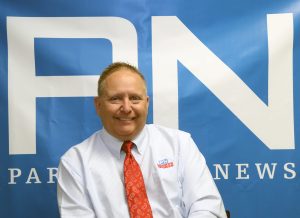We are here not only to speak our own minds, but we are here to speak the mind of the men who sent us here
By Tom Fjerstad/Editor
May once again brings Paralyzed Veterans of America’s (PVA) Annual Convention.
This year’s convention takes place at the Gaylord Rockies Resort & Convention Center in Aurora, Colo., near the Denver International Airport. There’s a lot that happens during PVA’s conventions. But at their core, the gatherings are meetings of the organization’s national board of directors.
The national board of directors coming together in one place often comes with intense deliberations on a plethora of business, including deciding official positions on subjects of importance to the organization, passing a budget and, of course, the election of officers.
Making decisions on important matters such as those requires the casting of votes, and keeping that process fair and efficient requires the use of some basic principles of parliamentary law.
During PVA’s first convention in February 1947, a lot of thought and discussion went into the details of the governance process that would be used by the representatives from the eight original associations. Much of that debate surrounded an idea that their votes needed to be weighted to fairly account for the number of paralyzed veterans that made up each of the respective associations.
What they envisioned was a way to allow the wishes of each and every member to be heard and accounted for in the decisions being made by this new national organization. Sounds pretty good so far, doesn’t it?
During this debate, the official minutes show Robert Moss, the representative from the Halloran Veterans Hospital on Staten Island in New York, argued, “We are here not only to speak our own minds, but we are here to speak the mind of the men who sent us here.”
However, the minutes also show that Ken Seaquist from the Kennedy Veterans Hospital in Memphis, Tenn., believed differently, as he stated, “I would like to make a suggestion that we don’t get too much politics in here. I am very much in favor of one vote per chapter.”
Ultimately, the weighted vote won out, but attempts to implement Seaquist’s wish of one vote per chapter continued for years and all failed. Then, through what some considered an act of parliamentary shenanigans, one vote per chapter was implemented for the first time in PVA history during the February 2010 national board of directors meeting in Orlando, Fla.
During those ever-important deliberations that created our organization, Moss made another motion — a motion that I believe was much more significant and is evidenced by the fact that it’s still in effect to this day.
As quoted in the official minutes from that 1947 convention, he stated, “I move that the Articles of Incorporation be amended to state that Robert’s Rules of Order will govern the procedure at all meetings.”
Robert’s Rules of Order can most simply be described as a book of rules used to govern the proceedings of an assembly such as ours in a fair and efficient manner. I believe Henry Robert, author of this gold standard in parliamentary law, said it best: “Where there is no law, but every man does what is right in his own eyes, there is the least of real liberty.”
Whether it’s making decisions that are rooted in health care, advocacy or even the internal governance of our organization, you can rest assured that they’re being made with a genuine concern for each of you with sincere thoughtfulness toward your well-being.
In my own discussions about PVA with other professional parliamentarians over the years, they’re always impressed with the level of sophistication in, and genuine respect for, the rules of procedure used in our governance.
If you know a member of the national board of directors, please wish him or her well as he or she heads to Colorado to deliberate on issues that may very well affect your life as a paralyzed veteran.


